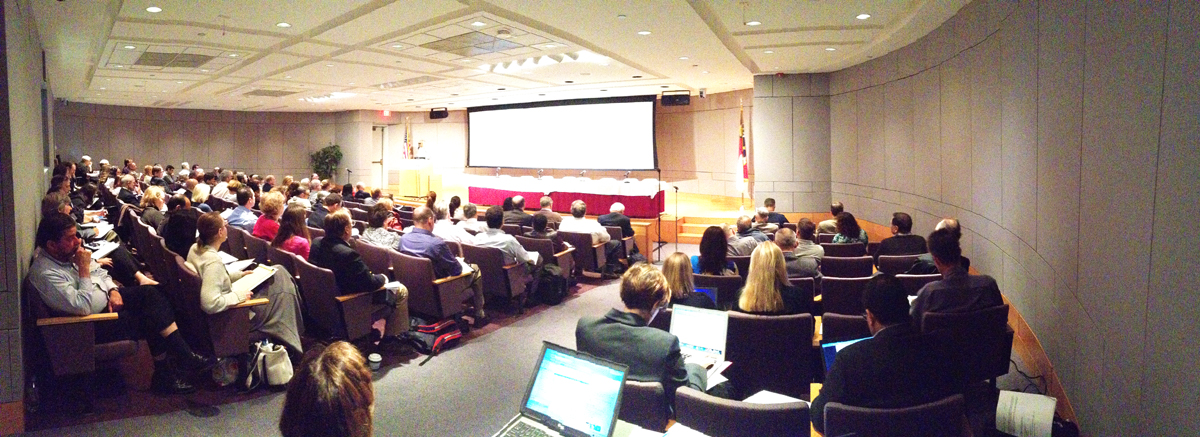Lessons Learned, Challenges, and Opportunities: The US Endocrine Disruptor Screening Program

Workshop Report Published in ALTEX - link to PDF
Multi-stakeholder Workshop on Lessons Learned, Challenges, and Opportunities: The U.S. Endocrine Disruptor Screening Program – Workshop Report Published This multi-stakeholder workshop, held in April 2013 in Research Triangle Park, brought together over 240 scientists from federal regulatory agencies, NGOs, industry, contract laboratory scientists, and academic researchers to review and discuss the challenges and lessons learned from the initial experiences with Tier 1 screening assays under the US Environmental Protection Agency's Endocrine Disruptor Screening Program (EDSP). The public workshop, organized and run by TERA provided a framework for retrospective analysis of the data generated and to collect the insight of multiple stakeholders involved in the testing. A number of key learnings and recommendations related to future EDSP evaluations emanated from the collective sessions.
Juberg et al. t4Workshop Report, Lessons Learned, Challenges, and Opportunities: The U.S. Endocrine Disruptor Screening Program. ALTEX.
Date: April 2013
Location: North Carolina Biotechnology Center, Research Triangle Park, North Carolina
![]() Meeting Program (Includes speaker bios and abstracts)
Meeting Program (Includes speaker bios and abstracts)
The Endocrine Disruptor Screening Program (EDSP) was implemented by the US Environmental Protection Agency (EPA) by issuing the first round of test orders in 2009 for information on 67 chemicals (59 pesticide active ingredients and 8 pesticide inert ingredients). The request includes information from a battery of screening assays, referred to as Tier 1, includes five in vitro assays, four mammalian assays, and two non-mammalian assays. Tier 1 screening of this initial list of chemicals has now been completed and the data have been submitted to EPA. This screening has yielded large volumes of data derived from numerous laboratories and on a variety of chemical classes.
A FORUM TO SHARE EXPERIENCE AND INSIGHTS
The results from this first phase of testing represent the first comprehensive experience with these assays individually and as a battery in a regulatory context. The experience and insight of the practitioners and laboratories conducting the screening provides an unprecedented resource for informing the future success of the program.
This workshop brings together multiple stakeholders for the opportunity to review and discuss the challenges and lessons learned from the initial experiences with Tier 1 screening assays in an open forum. Such an open meeting with all stakeholders – including Federal Regulatory Agencies, NGOs, industry, contract laboratory scientists, and academic researchers - is critical - and timely - to best use this collective experience for potential improvements in Tier 1 assays, and to further advance our ability to assess endocrine disruption. All stakeholders and interested parties are invited to participate.
WORKSHOP OBJECTIVES
This open workshop is designed to focus on the science and experience to date and is not intended to be a forum to discuss individual chemicals and their performance in the Tier 1 screening assays. Lessons learned and the ensuing discussion/outcomes at this workshop will support the use and implementation of the proposed advancements described in the EDSP21 (Endocrine Disruptor Screening Program – 21st Century) and TT21C (Toxicity Testing in the 21st Century) visions.
- Provide participants with knowledge gained and lessons learned, including assay performance, by laboratories and organizations that performed testing on the initial list of chemicals.
- Identify challenges and best practices in the technical and biological assessment of endocrine modulation.
- Discuss insights on the challenges of integrating and interpreting the data collected from Tier 1 assays (e.g., weight of evidence approaches and signature patterns).
- Explore insights on biological mechanisms relevant to endocrine modulation and their application in assay result interpretation and decision making.
- Engage perspectives from a range of stakeholders, including academia, government, industry, and NGOs on the future implementation, challenges, and opportunities regarding how to best address the challenges and opportunities for screening potential endocrine modulating chemicals in the 21st century.
- Rick Becker, American Chemistry Council
- Susan Borghoff, Integrated Laboratory Systems, Co-Chair
- Warren Casey, National Institute of Environmental Health Sciences
- Thomas Hartung, Center for Alternatives to Animal Testing, Johns Hopkins University
- Michael Holsapple, Battelle
- Daland Juberg, Dow AgroSciences, Co-Chair
- Sue Marty, The Dow Chemical Company
- Ellen Mihaich, Endocrine Policy Forum
- Glen Van Der Kraak, University of Guelph
- Mike Wade, Health Canada
- Kate Willett, Humane Society of the United States
- ABC Laboratories, Inc.
- AERC - REgNet
- Alkylphenols & Ethoxylates Research Council
- Alliance for Risk Assessment
- American Chemistry Council
- American Cleaning Institute
- American Petroleum Institute
- AMVAC Chemical Corporation
- Applied Pharmacology and Toxicology, Inc.
- BASF Corporation
- Battelle
- Bayer CropScience
- Center for Alternatives to Animal Testing (CAAT/Johns Hopkins)
- CeeTox, Inc.
- Cheminova
- Council of Producers & Distributors of Agrotechnology
- Consumer Specialty Products Association
- CropLife America
- Doerenkamp-Zbinden Foundation
- Dow AgroSciences
- DuPont
- Endocrine Policy Forum
- ExxonMobil Biomedical Sciences, Inc.
- Grocery Manufacturers Association
- Gowan
- Huntingdon Life Sciences/LSR Associates
- Human Toxicology Project Consortium
- The Humane Society of the United States
- Integrated Laboratory Systems, Inc.
- Makhteshim Agan of North America, Inc.
- Monsanto
- MTBE Consortium
- North Carolina Biotechnology Center
- Personal Care Products Council
- Smithers Viscient
- Society of Chemical Manufacturers and Affiliates, Inc.
- Styrene Information and Research Council
- Society of Toxicology
- SOT Regulatory Safety Evaluation Specialty Section (RSESS)
- SOT Ethical, Legal and Social Issue Specialty Group (ELSI)
- Syngenta
- Toxicology Excellence for Risk Assessment (TERA)
- WIL Research
- Wildlife International
For more information, contact Jacqueline Patterson (patterson@tera.org or 513-542-7475).